- Home
- Andrzej Sapkowski
Blood of Elves
Blood of Elves Read online
The characters and events in this book are fictitious. Any similarity to real persons, living or dead, is coincidental and not intended by the author.
Original text copyright © Andrzej Sapkowski 1994
English translation copyright © Danusia Stok 2008
All rights reserved. Except as permitted under the U.S. Copyright Act of 1976, no part of this publication may be reproduced, distributed, or transmitted in any form or by any means, or stored in a database or retrieval system, without the prior written permission of the publisher.
Orbit
Hachette Book Group
237 Park Avenue, New York, NY 10017
Visit our Web site at www.HachetteBookGroup.com
Orbit is an imprint of Hachette Book Group. The Orbit name and logo are trademarks of Little, Brown Book Group Limited.
Originally published in hardcover by Gollancz in the UK, 2008
First eBook Edition: May 2009
ISBN: 978-0-316-07371-4
Contents
Copyright Page
CHAPTER ONE
CHAPTER TWO
CHAPTER THREE
CHAPTER FOUR
CHAPTER FIVE
CHAPTER SIX
CHAPTER SEVEN
Extras
Meet the Author
THE LAST WISH
“I’d be proud,” she said quietly, lowering her head. “I’d be proud and happy to fight at your side.”
“I believe that. But I’m not gallant enough. Nor valiant enough. I’m not suited to be a soldier or a hero. And having an acute fear of pain, mutilation and death is not the only reason. You can’t stop a soldier from being frightened but you can give him motivation to help him overcome that fear. I have no such motivation. I can’t have. I’m a witcher: an artificially created mutant. I kill monsters for money. I defend children when their parents pay me to. If Nilfgaardian parents pay me, I’ll defend Nilfgaardian children. And even if the world lies in ruin—which does not seem likely to me—I’ll carry on killing monsters in the ruins of this world until some monster kills me. That is my fate, my reason, my life and my attitude to the world. And it is not what I chose. It was chosen for me.”… “But I don’t want to die in a war, because they’re not my wars.”
Praise for Andrzej Sapkowski:
“Sapkowski has a phenomenal gift for narrative, for inventing sensational events, creating a suggestive mood, and building up the suspense. Along with a dazzling, slightly cynical sense of humor.”
—Jacek Sieradzki, Polityka
“The character interplay is complex, unsentimental and anchored in brutal shared history. All bodes well for twisty plotting in future volumes.”
—SFX on Blood of Elves
Books by Andrzej Sapkowski
The Last Wish
Blood of Elves
Verily I say unto you, the era of the sword and axe is nigh, the era of the wolf’s blizzard. The Time of the White Chill and the White Light is nigh, the Time of Madness and the Time of Contempt: Tedd Deireádh, the Time of End. The world will die amidst frost and be reborn with the new sun. It will be reborn of the Elder Blood, of Hen Ichaer, of the seed that has been sown. A seed which will not sprout but will burst into flame.
Ess’tuath esse! Thus it shall be! Watch for the signs! What signs these shall be, I say unto you: first the earth will flow with the blood of Aen Seidhe, the Blood of Elves…
Aen Ithlinnespeath,
Ithlinne Aegli aep Aevenien’s prophecy
CHAPTER ONE
The town was in flames.
The narrow streets leading to the moat and the first terrace belched smoke and embers, flames devouring the densely clustered thatched houses and licking at the castle walls. From the west, from the harbour gate, the screams and clamour of vicious battle and the dull blows of a battering ram smashing against the walls grew ever louder.
Their attackers had surrounded them unexpectedly, shattering the barricades which had been held by no more than a few soldiers, a handful of townsmen carrying halberds and some crossbowmen from the guild. Their horses, decked out in flowing black caparisons, flew over the barricades like spectres, their riders’ bright, glistening blades sowing death amongst the fleeing defenders.
Ciri felt the knight who carried her before him on his saddle abruptly spur his horse. She heard his cry. “Hold on,” he shouted. “Hold on!”
Other knights wearing the colours of Cintra overtook them, sparring, even in full flight, with the Nilfgaardians. Ciri caught a glimpse of the skirmish from the corner of her eye – the crazed swirl of blue-gold and black cloaks amidst the clash of steel, the clatter of blades against shields, the neighing of horses—
Shouts. No, not shouts. Screams.
“Hold on!”
Fear. With every jolt, every jerk, every leap of the horse pain shot through her hands as she clutched at the reins. Her legs contracted painfully, unable to find support, her eyes watered from the smoke. The arm around her suffocated her, choking her, the force compressing her ribs. All around her screaming such as she had never before heard grew louder. What must one do to a man to make him scream so?
Fear. Overpowering, paralysing, choking fear.
Again the clash of iron, the grunts and snorts of the horses. The houses whirled around her and suddenly she could see windows belching fire where a moment before there’d been nothing but a muddy little street strewn with corpses and cluttered with the abandoned possessions of the fleeing population. All at once the knight at her back was wracked by a strange wheezing cough. Blood spurted over the hands grasping the reins. More screams. Arrows whistled past.
A fall, a shock, painful bruising against armour. Hooves pounded past her, a horse’s belly and a frayed girth flashing by above her head, then another horse’s belly and a flowing black caparison. Grunts of exertion, like a lumberjack’s when chopping wood. But this isn’t wood; it’s iron against iron. A shout, muffled and dull, and something huge and black collapsed into the mud next to her with a splash, spurting blood. An armoured foot quivered, thrashed, goring the earth with an enormous spur.
A jerk. Some force plucked her up, pulled her onto another saddle. Hold on! Again the bone-shaking speed, the mad gallop. Arms and legs desperately searching for support. The horse rears. Hold on!… There is no support. There is no… There is no… There is blood. The horse falls. It’s impossible to jump aside, no way to break free, to escape the tight embrace of these chainmail-clad arms. There is no way to avoid the blood pouring onto her head and over her shoulders.
A jolt, the squelch of mud, a violent collision with the ground, horrifically still after the furious ride. The horse’s harrowing wheezes and squeals as it tries to regain its feet. The pounding of horseshoes, fetlocks and hooves flashing past. Black caparisons and cloaks. Shouting.
The street is on fire, a roaring red wall of flame. Silhouetted before it, a rider towers over the flaming roofs, enormous. His black-caparisoned horse prances, tosses its head, neighs.
The rider stares down at her. Ciri sees his eyes gleaming through the slit in his huge helmet, framed by a bird of prey’s wings. She sees the fire reflected in the broad blade of the sword held in his lowered hand.
The rider looks at her. Ciri is unable to move. The dead man’s motionless arms wrapped around her waist hold her down. She is locked in place by something heavy and wet with blood, something which is lying across her thigh, pinning her to the ground.
And she is frozen in fear: a terrible fear which turns her entrails inside out, which deafens Ciri to the screams of the wounded horse, the roar of the blaze, the cries of dying people and the pounding drums. The only thing which exists, which counts, which still has any meaning, is fear. Fear embodied in the figure of a black knight weari
ng a helmet decorated with feathers frozen against the wall of raging, red flames.
The rider spurs his horse, the wings on his helmet fluttering as the bird of prey takes to flight, launching itself to attack its helpless victim, paralysed with fear. The bird – or maybe the knight – screeches terrifyingly, cruelly, triumphantly. A black horse, black armour, a black flowing cloak, and behind this – flames. A sea of flames.
Fear.
The bird shrieks. The wings beat, feathers slap against her face. Fear!
Help! Why doesn’t anyone help me? Alone, weak, helpless – I can’t move, can’t force a sound from my constricted throat. Why does no one come to help me?
I’m terrified!
Eyes blaze through the slit in the huge winged helmet. The black cloak veils everything—
“Ciri!”
She woke, numb and drenched in sweat, with her scream – the scream which had woken her – still hanging in the air, still vibrating somewhere within her, beneath her breast-bone and burning against her parched throat. Her hands ached, clenched around the blanket; her back ached…
“Ciri. Calm down.”
The night was dark and windy, the crowns of the surrounding pine trees rustling steadily and melodiously, their limbs and trunks creaking in the wind. There was no malevolent fire, no screams, only this gentle lullaby. Beside her the campfire flickered with light and warmth, its reflected flames glowing from harness buckles, gleaming red in the leather-wrapped and iron-banded hilt of a sword leaning against a saddle on the ground. There was no other fire and no other iron. The hand against her cheek smelled of leather and ashes. Not of blood.
“Geralt—”
“It was just a dream. A bad dream.”
Ciri shuddered violently, curling her arms and legs up tight.
A dream. Just a dream.
The campfire had already died down; the birch logs were red and luminous, occasionally crackling, giving off tiny spurts of blue flame which illuminated the white hair and sharp profile of the man wrapping a blanket and sheepskin around her.
“Geralt, I—”
“I’m right here. Sleep, Ciri. You have to rest. We’ve still a long way ahead of us.”
I can hear music, she thought suddenly. Amidst the rustling of the trees… there’s music. Lute music. And voices. The Princess of Cintra… A child of destiny… A child of Elder Blood, the blood of elves. Geralt of Rivia, the White Wolf, and his destiny. No, no, that’s a legend. A poet’s invention. The princess is dead. She was killed in the town streets while trying to escape…
Hold on… !Hold…
“Geralt?”
“What, Ciri?”
“What did he do to me? What happened? What did he… do to me?”
“Who?”
“The knight… The black knight with feathers on his helmet… I can’t remember anything. He shouted… and looked at me. I can’t remember what happened. Only that I was frightened… I was so frightened…”
The man leaned over her, the flame of the campfire sparkling in his eyes. They were strange eyes. Very strange. Ciri had been frightened of them, she hadn’t liked meeting his gaze. But that had been a long time ago. A very long time ago.
“I can’t remember anything,” she whispered, searching for his hand, as tough and coarse as raw wood. “The black knight—”
“It was a dream. Sleep peacefully. It won’t come back.”
Ciri had heard such reassurances in the past. They had been repeated to her endlessly; many, many times she had been offered comforting words when her screams had woken her during the night. But this time it was different. Now she believed it. Because it was Geralt of Rivia, the White Wolf, the Witcher, who said it. The man who was her destiny. The one for whom she was destined. Geralt the Witcher, who had found her surrounded by war, death and despair, who had taken her with him and promised they would never part.
She fell asleep holding tight to his hand.
The bard finished the song. Tilting his head a little he repeated the ballad’s refrain on his lute, delicately, softly, a single tone higher than the apprentice accompanying him.
No one said a word. Nothing but the subsiding music and the whispering leaves and squeaking boughs of the enormous oak could be heard. Then, all of a sudden, a goat tethered to one of the carts which circled the ancient tree bleated lengthily. At that moment, as if given a signal, one of the men seated in the large semi-circular audience stood up. Throwing his cobalt blue cloak with gold braid trim back over his shoulder, he gave a stiff, dignified bow.
“Thank you, Master Dandilion,” he said, his voice resonant without being loud. “Allow me, Radcliffe of Oxenfurt, Master of the Arcana, to express what I am sure is the opinion of everyone here present and utter words of gratitude and appreciation for your fine art and skill.”
The wizard ran his gaze over those assembled – an audience of well over a hundred people – seated on the ground, on carts, or standing in a tight semi-circle facing the foot of the oak. They nodded and whispered amongst themselves. Several people began to applaud while others greeted the singer with upraised hands. Women, touched by the music, sniffed and wiped their eyes on whatever came to hand, which differed according to their standing, profession and wealth: peasant women used their forearms or the backs of their hands, merchants’ wives dabbed their eyes with linen handkerchiefs while elves and noblewomen used kerchiefs of the finest tight-woven cotton, and Baron Vilibert’s three daughters, who had, along with the rest of his retinue, halted their falcon hunt to attend the famous troubadour’s performance, blew their noses loudly and sonorously into elegant mould-green cashmere scarves.
“It would not be an exaggeration to say,” continued the wizard, “that you have moved us deeply, Master Dandilion. You have prompted us to reflection and thought; you have stirred our hearts. Allow me to express our gratitude, and our respect.”
The troubadour stood and took a bow, sweeping the heron feather pinned to his fashionable hat across his knees. His apprentice broke off his playing, grinned and bowed too, until Dandilion glared at him sternly and snapped something under his breath. The boy lowered his head and returned to softly strumming his lute strings.
The assembly stirred to life. The merchants travelling in the caravan whispered amongst themselves and then rolled a sizable cask of beer out to the foot of the oak tree. Wizard Radcliffe lost himself in quiet conversation with Baron Vilibert. Having blown their noses, the baron’s daughters gazed at Dandilion in adoration – which went entirely unnoticed by the bard, engrossed as he was in smiling, winking and flashing his teeth at a haughty, silent group of roving elves, and at one of them in particular: a dark-haired, large-eyed beauty sporting a tiny ermine cap. Dandilion had rivals for her attention – the elf, with her huge eyes and beautiful toque hat, had caught his audience’s interest as well, and a number of knights, students and goliards were paying court to her with their eyes. The elf clearly enjoyed the attention, picking at the lace cuffs of her chemise and fluttering her eyelashes, but the group of elves with her surrounded her on all sides, not bothering to hide their antipathy towards her admirers.
The glade beneath Bleobheris, the great oak, was a place of frequent rallies, a well-known travellers’ resting place and meeting ground for wanderers, and was famous for its tolerance and openness. The druids protecting the ancient tree called it the Seat of Friendship and willingly welcomed all comers. But even during an event as exceptional as the world-famous troubadour’s just-concluded performance the travellers kept to themselves, remaining in clearly delineated groups. Elves stayed with elves. Dwarfish craftsmen gathered with their kin, who were often hired to protect the merchant caravans and were armed to the teeth. Their groups tolerated at best the gnome miners and halfling farmers who camped beside them. All non-humans were uniformly distant towards humans. The humans repaid in kind, but were not seen to mix amongst themselves either. Nobility looked down on the merchants and travelling salesmen with open scorn, while soldiers and mer
cenaries distanced themselves from shepherds and their reeking sheepskins. The few wizards and their disciples kept themselves entirely apart from the others, and bestowed their arrogance on everyone in equal parts. A tight-knit, dark and silent group of peasants lurked in the background. Resembling a forest with their rakes, pitchforks and flails poking above their heads, they were ignored by all and sundry.
The exception, as ever, was the children. Freed from the constraints of silence which had been enforced during the bard’s performance, the children dashed into the woods with wild cries, and enthusiastically immersed themselves in a game whose rules were incomprehensible to all those who had bidden farewell to the happy years of childhood. Children of elves, dwarves, halflings, gnomes, half-elves, quarter-elves and toddlers of mysterious provenance neither knew nor recognised racial or social divisions. At least, not yet.
“Indeed!” shouted one of the knights present in the glade, who was as thin as a beanpole and wearing a red and black tunic emblazoned with three lions passant. “The wizard speaks the truth! The ballads were beautiful. Upon my word, honourable Dandilion, if you ever pass near Baldhorn, my lord’s castle, stop by without a moment’s hesitation. You will be welcomed like a prince– what am I saying? Welcomed like King Vizimir himself! I swear on my sword, I have heard many a minstrel, but none even came close to being your equal, master. Accept the respect and tributes those of us born to knighthood, and those of us appointed to the position, pay to your skills!”
Flawlessly sensing the opportune moment, the troubadour winked at his apprentice. The boy set his lute aside and picked up a little casket which served as a collection box for the audience’s more measurable expressions of appreciation. He hesitated, ran his eyes over the crowd, then replaced the little casket and grabbed a large bucket standing nearby. Master Dandilion bestowed an approving smile on the young man for his prudence.
“Master!” shouted a sizeable woman sitting on a cart, the sides of which were painted with a sign for “Vera Loewenhaupt and Sons,” and which was full of wickerwork. Her sons, nowhere to be seen, were no doubt busy wasting away their mother’s hard-earned fortune. “Master Dandilion, what is this? Are you going to leave us in suspense? That can’t be the end of your ballad? Sing to us of what happened next!”

 something ends something begins sapkowski
something ends something begins sapkowski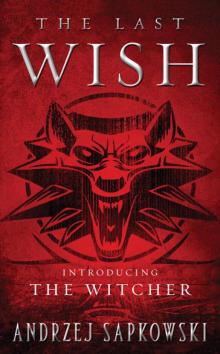 The Last Wish
The Last Wish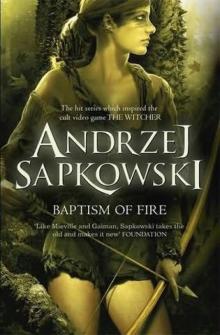 Baptism of Fire
Baptism of Fire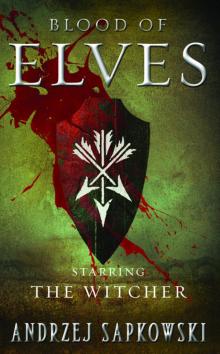 Blood of Elves
Blood of Elves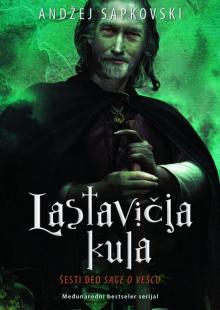 Lastavičja Kula
Lastavičja Kula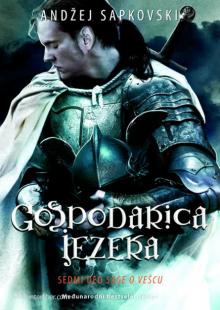 Gospodarica Jezera
Gospodarica Jezera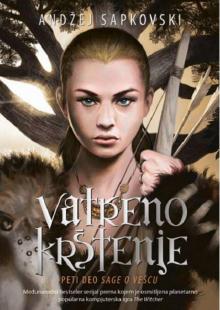 Vatreno Krštenje
Vatreno Krštenje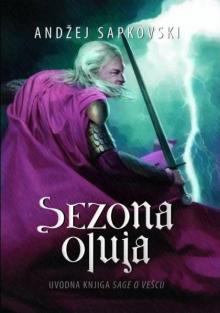 Sezona Oluja
Sezona Oluja Lady of the Lake
Lady of the Lake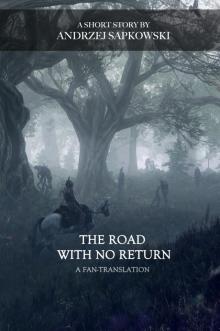 The Road With No Return
The Road With No Return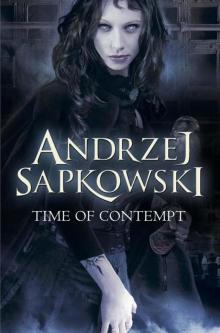 Time of Contempt
Time of Contempt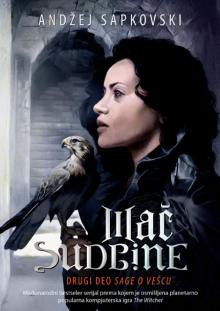 Mač Sudbine
Mač Sudbine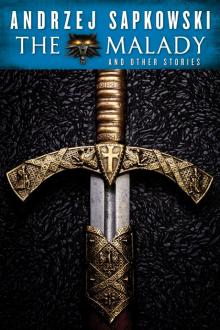 The Malady and Other Stories: An Andrzej Sapkowski Sampler
The Malady and Other Stories: An Andrzej Sapkowski Sampler The Saga of the Witcher
The Saga of the Witcher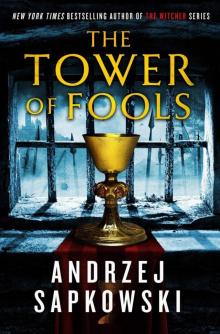 The Tower of Fools
The Tower of Fools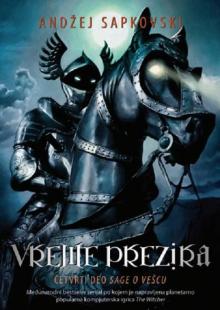 Vreme Prezira
Vreme Prezira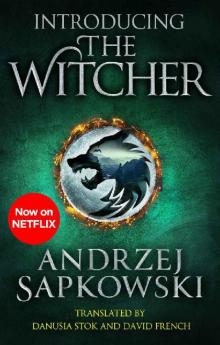 Introducing the Witcher
Introducing the Witcher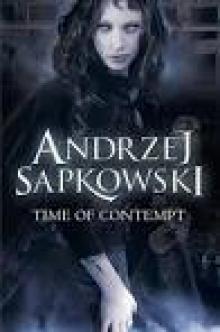 Stephen Hulin
Stephen Hulin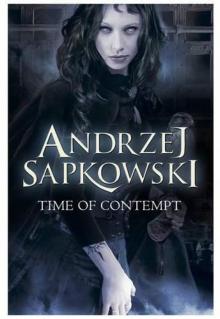 The Time of Contempt
The Time of Contempt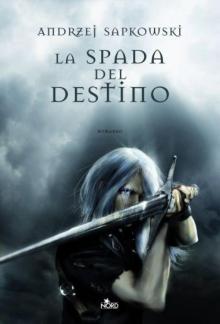 The Sword of Destiny
The Sword of Destiny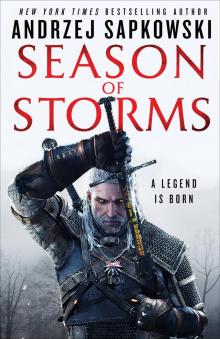 Season of Storms
Season of Storms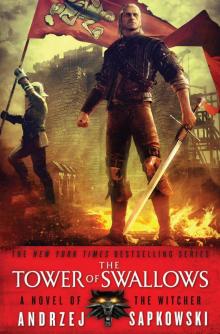 The Tower of Swallows
The Tower of Swallows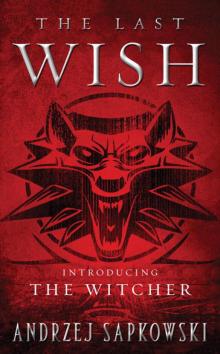 The Last Wish: Introducing The Witcher
The Last Wish: Introducing The Witcher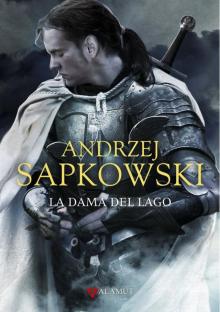 The Lady of the Lake
The Lady of the Lake